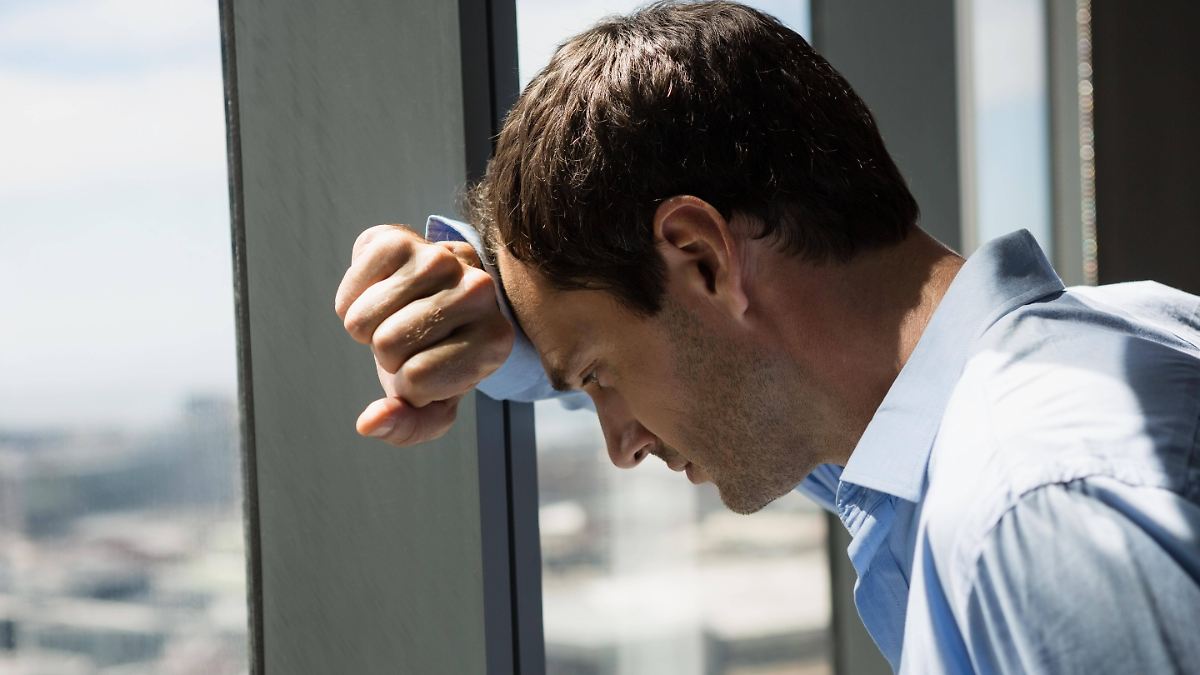
War, crises, fear: How can we protect our mental health?
Fear of the future, brooding, exhaustion: ongoing crises such as climate change or international conflicts can put a heavy strain on our psyche. How can we protect ourselves? Psychologist Dr. Alena Rentsch explains in an interview.
From climate change to the pandemic to the economic crisis or wars and conflicts: the news gives many people the feeling of being caught in a permanent crisis – and that can put a heavy strain on our psyche. In a study from last year, almost half of Germans (43 percent) said they were much or somewhat more worried than they were twelve months ago.
The top concerns are inflation and rising prices, the political situation at home and abroad, concern for one’s own children and fear of increasing division in society. And this can have a strong impact on our mental health: In the study, more than a quarter of those surveyed said they were brooding more or feeling exhausted and lacking energy – especially in Generation Z.
How can we pay more attention to our mental health in times when crises seem to be rife everywhere? In an interview, Dr. Alena Rentsch, psychological psychotherapist at the online platform HelloBetter, explains exactly how crises affect our psyche, how we can achieve a balance and how young people in particular can be protected.
What do global crises such as climate change, wars or economic uncertainty do to our mental health?
Dr. Alena Rentsch: Crises are events or changes in life that are difficult or impossible to cope with at the moment and are accompanied by a loss of psychological balance. From a psychological point of view, crises put us under acute stress because we feel like we have lost control of the internal or external situation. The reactions to this stress can be very different for each person.
This can be seen, for example, in exhaustion, nervousness or concentration problems. Thoughts often revolve around the experience during the day, thoughts like “everything is just too much for me right now” become widespread or physical symptoms such as insomnia, stomach problems or headaches appear. If these symptoms are short-lived, then they are usually no cause for concern. However, anyone who feels overwhelmed by a crisis or their daily life over a longer period of time has an increased risk of becoming seriously ill.
Is this a new development because crises are much more present through social media and online news?
The psychological stress caused by crises in the world is not a new phenomenon, but it has changed due to digitalization. Through social media and online news, we are constantly confronted with the problems and suffering of others that can affect and burden us.
Basically, however, there are various factors that influence our mental health, such as our individual resilience, our social environment, our living conditions and our personal experiences.
In summary, constant exposure to negative news and images from around the world can cause us to feel more stress, anxiety or sadness. But it can also make us feel more solidarity, empathy or hope through these media. So it all depends on how we process the information and how we protect ourselves from it or deal with it.
Simply ignoring negative news is not a solution either. How can you create a good balance to protect your own mental health?
To deal with news in a healthy way, several aspects need to be taken into account. First of all, it is important to pay attention to the quality of the information. This means choosing trustworthy sources and not getting information exclusively from social media.
In addition, news podcasts or reading a daily newspaper can help you maintain an emotional distance from stressful topics. The advantage of podcasts is that they do not present images, and daily newspapers often offer less image-heavy content than online media or TV. It is also helpful to follow constructive news and notice positive developments. There are formats that specialize in highlighting positive events and progress in the world and society.
Another important point is timing: it may be wise to limit consumption to once a day and especially not shortly before going to bed. This can help reduce mental stress.
In addition, it is crucial to step out of the digital space and actively participate in real life. Meeting with friends, exchanging ideas on different topics, pursuing hobbies such as sports, art or music – all of this helps to actively participate in life and not focus exclusively on the news.
Finally, it is important to find a channel for the energy aroused by the news. Whether it is taking part in demonstrations, getting involved in politics, discussing things with friends or getting involved in other ways, it is essential to channel this energy into something useful rather than getting lost in an endless cycle of self-absorption.
Keyword “German Angst”: It is often said that Germans are a particularly fearful people and react less calmly to crises than others. Why is that? And why do some people find it easier to deal with crises?
The term “German Angst” suggests that Germans are very worried and react particularly fearfully, especially in crisis situations. However, fear in itself is not a negative emotion, but a natural and basic human reaction that can protect us from danger. It motivates us to take precautions and look for solutions. For example, fear of the climate crisis can be positive because it inspires action and change to address this global threat.
Why might Germans be particularly prone to fear and anxiety? One possible explanation is that historical events such as the two world wars, the division of the country and reunification have left deep scars in the collective psyche. Such profound crises can lead to a loss of security, orientation and identity. These historical influences could still play a role in how Germans react to crises today.
From a psychotherapeutic perspective, however, individual differences in dealing with crises are much more crucial. Some people find it easier to cope with stress and anxiety. This depends on various factors, such as personal resilience, previous experiences, social environment and the availability of resources and support. It is important to recognize that coping with anxiety is an individual process and that there are different ways to deal with challenges effectively.
Young people are particularly exposed to negative news through social media. How can parents protect their children?
Parents should definitely actively supervise their children’s news consumption. Younger children in particular should not consume news unsupervised, as they may have difficulty classifying the content on their own. There are valuable news programs for children that are specifically tailored to their needs. But here too, it is important that parents are there to discuss the content together, clarify children’s questions and provide the necessary context.
It is advisable to limit or at least supervise children’s media use, especially on social media. This may no longer be possible with teenagers, but parents can encourage them to follow reputable sites and formats that provide reliable information.
The emotional presence of parents is also important, especially if you notice that news about topics such as war or pandemics causes stress or anxiety. The topic of anxiety should be discussed openly and support offered.

Ethel Purdy – Medical Blogger & Pharmacist
Bridging the world of wellness and science, Ethel Purdy is a professional voice in healthcare with a passion for sharing knowledge. At 36, she stands at the confluence of medical expertise and the written word, holding a pharmacy degree acquired under the rigorous education systems of Germany and Estonia.
Her pursuit of medicine was fueled by a desire to understand the intricacies of human health and to contribute to the community’s understanding of it. Transitioning seamlessly into the realm of blogging, Ethel has found a platform to demystify complex medical concepts for the everyday reader.
Ethel’s commitment to the world of medicine extends beyond her professional life into a personal commitment to health and wellness. Her hobbies reflect this dedication, often involving research on the latest medical advances, participating in wellness communities, and exploring the vast and varied dimensions of health.
Join Ethel as she distills her pharmaceutical knowledge into accessible wisdom, fostering an environment where science meets lifestyle and everyone is invited to learn. Whether you’re looking for insights into the latest health trends or trustworthy medical advice, Ethel’s blog is your gateway to the nexus of healthcare and daily living.



